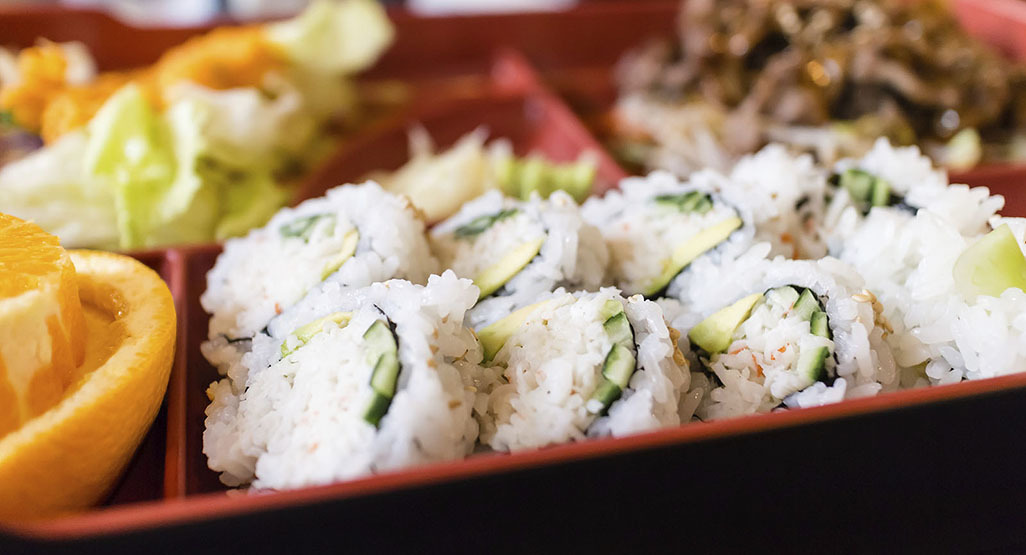Can I eat sushi while pregnant?
Yes, but steer clear of sushi made with raw fish. During pregnancy it's recommended that you only eat fish and shellfish that has been cooked to 145 degrees F. Cooking fish to this temperature destroys any potentially harmful parasites and pathogens (other disease-causing organisms such as bacteria and viruses).
It's important to avoid potentially dangerous foods during pregnancy because your immune system is suppressed. You're more susceptible to foodborne illnesses, such as listeriosis. Also, when you're pregnant foodborne illnesses can have serious negative effects for you and your baby.
Note: Even if fish has been previously frozen, it isn't safe to eat raw during pregnancy. While freezing can destroy potentially harmful parasites, it doesn't kill pathogens.
Is cooked sushi safe during pregnancy?
Yes, sushi with cooked fish is safe during pregnancy – with one caveat. It's important that the restaurant staff avoids cross-contamination from raw fish. Sushi with cooked ingredients should be prepared on different surfaces and with different utensils. If you're not sure that you can trust the place you're eating to follow these protocols, it's safer to order something else – like a bento box with teriyaki chicken or salmon.
But in general, cooked sushi that's safe for pregnancy includes:
- sushi made with cooked egg
- sushi made with cooked, low-mercury seafood, like eel or shrimp
- California rolls (the imitation crab or crab meat is cooked)
- vegan or vegetarian sushi rolls, like those with avocado or cucumber
When eating sushi, ask for low-sodium soy sauce or use just a bit of the regular kind. A tablespoon of soy sauce can contain as much as 1180 mg of sodium, about half of the total amount recommended daily.
Can I eat seared or smoked fish during pregnancy?
Fish that is seared is typically partially raw or undercooked. Since it's not all fully cooked to a safe temperature, it's best to avoid during pregnancy.
Also, you'll want to avoid refrigerated smoked fish unless you have it in a cooked dish, such as a casserole, that reaches an internal temperature of 165°F to kill harmful germs. It's also okay to eat smoked seafood during pregnancy if it's canned or shelf stable.
Advertisement | page continues below
How to make sure fish is safe to eat during pregnancy
Don't skip fish entirely while you're pregnant. It's a stellar source of protein, iron, vitamin B12, vitamin D and zinc, all nutrients that help keep you and your baby healthy. Some types of fish are also rich in omega-3 fatty acids, which help your baby's brain development. That's why U.S dietary guidelines recommend pregnant women eat between 8 to 12 ounces of seafood a week.
To eat fish safely during pregnancy:
Stick to small fish. To reduce your exposure to mercury, eat small fish like sardines, cod, haddock, flounder, salmon, tilapia, and canned light tuna. Don't eat large predatory fish like shark, swordfish, king mackerel, orange roughy, and tilefish. If you're having albacore (solid white) tuna, limit it to 4 ounces a week, and don't eat other fish that week.
Use caution with fish you catch. Before eating fish you catch yourself (or caught by family and friends) like larger carp, catfish, trout, and perch, check for state advisories that say how often you can safely eat them. If you can't find any information, limit your intake to less than six ounces a week.
Prepare seafood properly. Seafood should be cooked to an internal temperature of 145 degrees F (63 degrees C). If you don't have a food thermometer, follow these tips:
- Cook fish until it's opaque (milky white) and flakes with a fork.
- Cook shrimp, lobster, and scallops until they reach their appropriate color. The flesh of shrimp and lobster should be an opaque (milky white) color. Scallops should be opaque (milky white) and firm.
- Cook clams, mussels, and oysters until their shells open. This means that they're done. Throw away the ones that didn't open.
- Shucked clams and shucked oysters are fully cooked when they're opaque (milky white) and firm.


